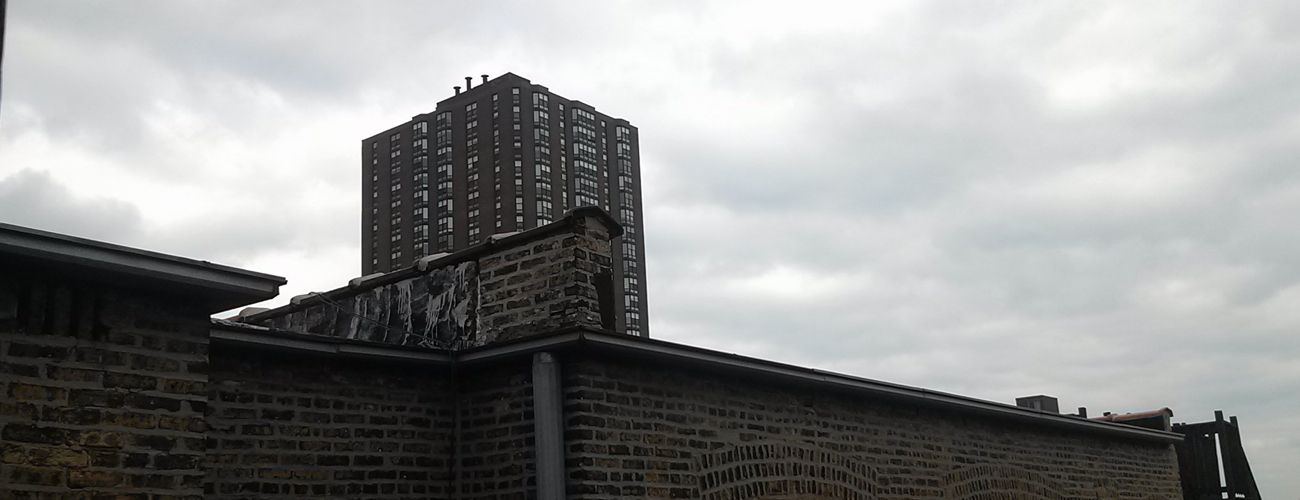Umbrella Music Festival 2013 Day 3

08 Nov 2013
Moments vs. MOMENTS! : Day Three of the Umbrella Music Festival
The keyword for tonight was ASSURED. In an age rife with empty gloating and overly apologetic self-scrutiny, it was a relief and an incredible pleasure to be treated to three sets of music that displayed such thorough and well-warranted confidence. These sets worked well individually, but immaculately altogether.
Shamefully, I can admit that I’ve harbored a skepticism that was, truthfully, tinged with jealousy toward the generation of improvisors that moved to Chicago after I left in 2000. One by one and year by year it dissipates as I become more and more familiar with their music, but the set by Frank Rosaly’s Cicada Music was so assured and gutsy that all my lesser emotions were instantaneously vanquished. Listening to this sextet (James Falzone on clarinet, Jason Stein on bass clarinet, Keefe Jackson on bass clarinet, contrabass clarinet and tenor sax, Jason Adasiewicz on vibes, Jason Roebke on doublebass, and Frank Rosaly on drums) became like listening to a favorite record I hadn’t heard in years: every second fulfilling exactly what I wanted the music to do and where I wanted it to go. And yet I had never heard this music before.
The tone of individual musicians is often discussed as a way to deal with the uniqueness of a person’s sound, but what’s more rare is when you hear a band that possesses a singular tone. Comfortable, polished, intense, supplicating: Frank Rosaly’s Cicada Music is well-rehearsed and well-written for. They know exactly what they’re doing, and they bring it with verve. Out to Lunch with the addition of a Julius Hemphill-like prowess for multiple-reed composition. Everything Rosaly did on drums was supported and supportive, all the parts in elastic synchrony. Adasiewicz’ vibes were like a Bacchanalian Bobby Hutcherson, expending a Nilssen-Love like energy to the controlled mayhem: Lionel Hampton with a cherry on top. There were elements of caterwauling from the front line of clarinets, but contextualized by other passages that made me love its placement in the overall balance and flow of sonorities.
The sound in the room at Constellation is also superbly clean, and the silkily polished floor––so good for dancing, so invitingly soft––made my feet want to snuggle into its warmth as I got more and more embraced by this first set of music. There are many moments in my life that I retroactively wish I could have been listening to this music; I like to think that, if I had, it would have made me capable of better decisions, more effort, more compassion, less bile. Raising children is a marathon; I don’t have any: Frank Rosaly’s Cicada Music put a chrysalis in me.
The trio of David Stackenäs on guitar, Dave Rempis on baritone and tenor saxophone, and Brian Labycz on synthesizer was, first, an amazingly odd combination of instruments in a genre of music that has seen more than its fair share of weird instrumental combinations. Second, the improvisations they made were music to focus on and be assured by, music for a hospital waiting room (non-emergency), circa 2428, and I guarantee it will be played there then. I guarantee it. Their collective sound demonstrated the paradox of constant subtlety and ideal companionship, a real foundation for success and homemaking.
The line between jazz and improvised music is moot, but Rempis used his baritone to reference Gene Ammons, Mats Gustafsson, and himself. The ridiculous variety of techniques––all the physical ways Stackenäs approached and attacked the guitar––made me think he’s like David Bowie, if Bowie understood jazz. Labycz basically played little hums and blurbly runs on his synth, but it’s all about context: what he played and when was what the music needed: a little hum here, a block of silence there; a gruff pop here, a feathery fade there. He almost functioned like a bassist, grounding every move of the band with focus and depth. Agile as fuck, these three displayed an amazing blend of instrumental textures and terrain. Froggy billowing, the burdens of our desires, sudden satisfaction, post-coital breath-catching triumph.
An incredible moment between Rempis and Labycz playing a duo of discrete baritone and synth shimmies was interrupted by a short Stackenäs solo intrusion, a collective pause, another short Stackenäs solo intrusion, and another, longer pause. The tension of whether they would end the piece there, or totally change direction, was a palpable physical force. But Rempis and Labycz went back to exactly what they were investigating, now with the addition of Stackenäs’ slutty wah-inflected heavy-metally cosmic bent-note microseconds. Perfect. It was a hell of a moment. The vulnerability that improvised music is known for––but which is all too rarely really confronted––was amply displayed, deftly exploited, and rousingly exulted in.
Tar Baby’s set began with a phenomenal exchange of concentrated miniatures between pianist Orrin Evans and drummer Nasheet Waits that was framed by silences poised enough to make you think you can, indeed, jump off the edge of that mountain and, yes, land in the ocean. Their exchange was so subtle that the maniacally hyper entrance of doublebassist Eric Revis I genuinely took to be a caricature of free jazz overplaying. Until he kept it up. And it worked. Like I said: assured.
Revis stands behind the bass and holds it at a practically perpendicular angle to his body, like an ur-confrontation of man vs. instrument, the tools of the world vs. the whole well of the cosmos’ virtual reserve hanging in the balance. Evans, especially when soloing, was the very picture of intellect at work: obviously concocting and processing within but using the barest amount of physical effort possible to produce pitch-perfect emotional pictures. I heard a liquefied stride piano in his runs, and I was thankful for the fluidity, and the history, and how both should be both. I saw Waits play once about eight years ago, so I knew he was an absolute virtuoso, but, damn, every single little move he made was touching. There was humor and there was history in his sound too, as he played a kind of lazy smooth jazz accent satirized into a hard-bop funk trill––with rim shots––capping it off with just the thinnest silence to frame a simultaneous cymbal crash and bassdrum blast. Yes please.
During a pregnant pause in a downbeat, Revis suddenly shouted “OOOOOh!” A little bit later, Evans issued the same “OOOOh!” in the pause. Then, collectively, again: “OOOOOOOhh!” The original human sound, the shape of the open mouth: O. When the pause appeared again, silence, and just the slightest turn of the head from Evans, as if taunting the audience to hear (or make) the “O.” Hilarious, profound, like discovering the primal essence of the difference between sound and silence.
Silence is primal too. When you’re listening to live music, it’s possible for
the mind to drift. You think about what you’re doing after the set, what the next day holds, if you need to eat, the girl that seems to want to fuck you, if you have money for a jar of good honey. But when you’re really listening, you don’t think about any of that, you’re way too occupied with every movement of the music: you’re absorbed and absorbing. This whole night was that kind of pure rarity, where all the music grabbed ahold of my senses and taught me lessons and quenched every craving and, through sound alone, hacked the bourgeois quest for comforting novelty with a vitality appearing in the form of grill marks searching for the meat they must sear.
– Andrew Choate
